“Trev is still looking after me” says Pauline
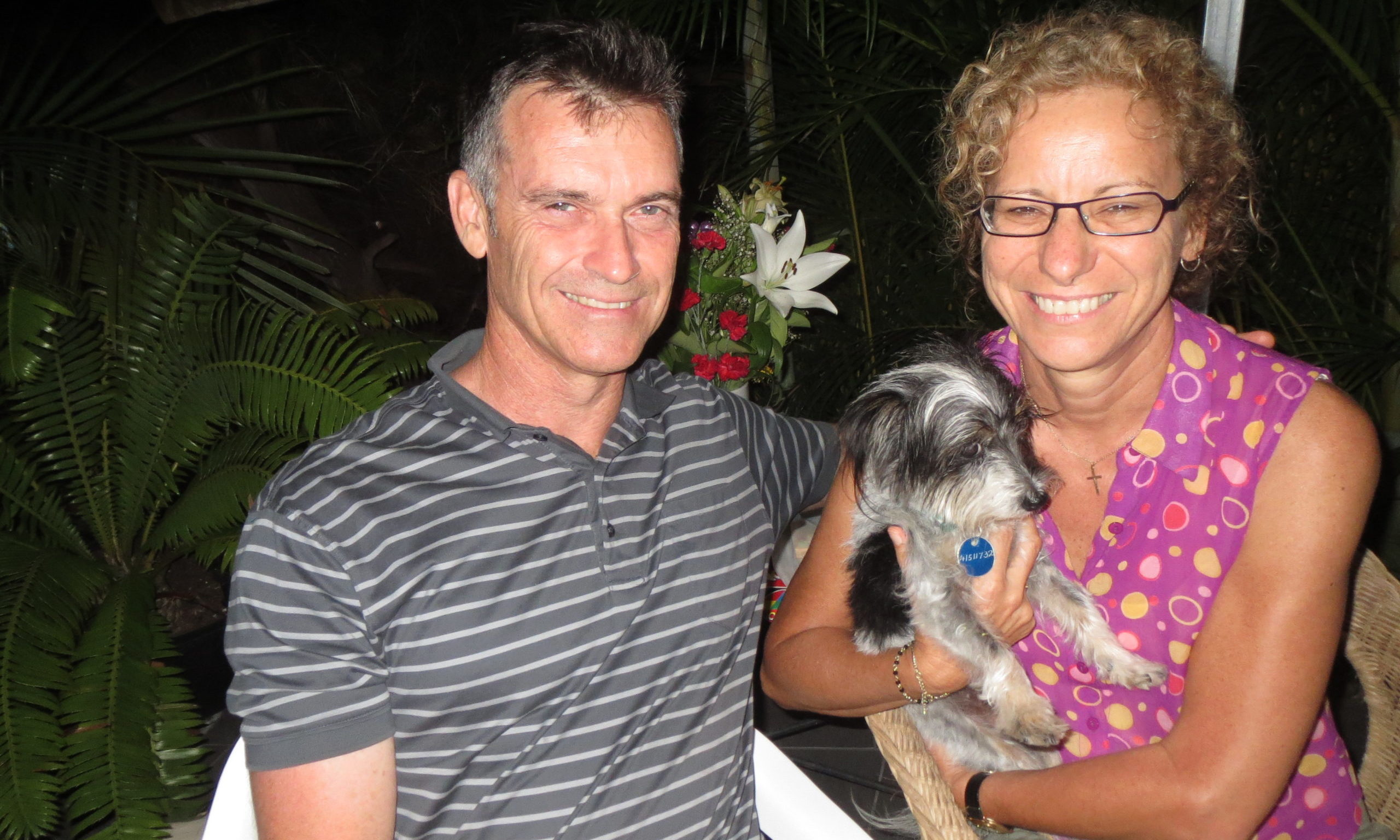
Had Pauline Vedelago been told, 3½ years ago, that she would no longer have her husband, dog, house, job, or live in Bundaberg, she would have said, “are you crazy?”.
“My life was so different 3½ years ago,” said Pauline, 58, who is retired, volunteers two days a week, and writes to her late husband every night, telling him about her day.
While there are many blood cancer success stories, unfortunately there also are stories where treatment is unsuccessful, the disease mutates, and in the end, devastatingly, there are no further options.
Sadly, this happened to Pauline’s husband of 31 years, Trevor Boyd, a teacher-librarian whose prognosis was “pretty good” when diagnosed with non-Hodgkin lymphoma (NHL) in May 2017, aged 55.
Over the next 2½ years, the couple, went back and forth from their home in Bundaberg to Brisbane, for tests and treatment.
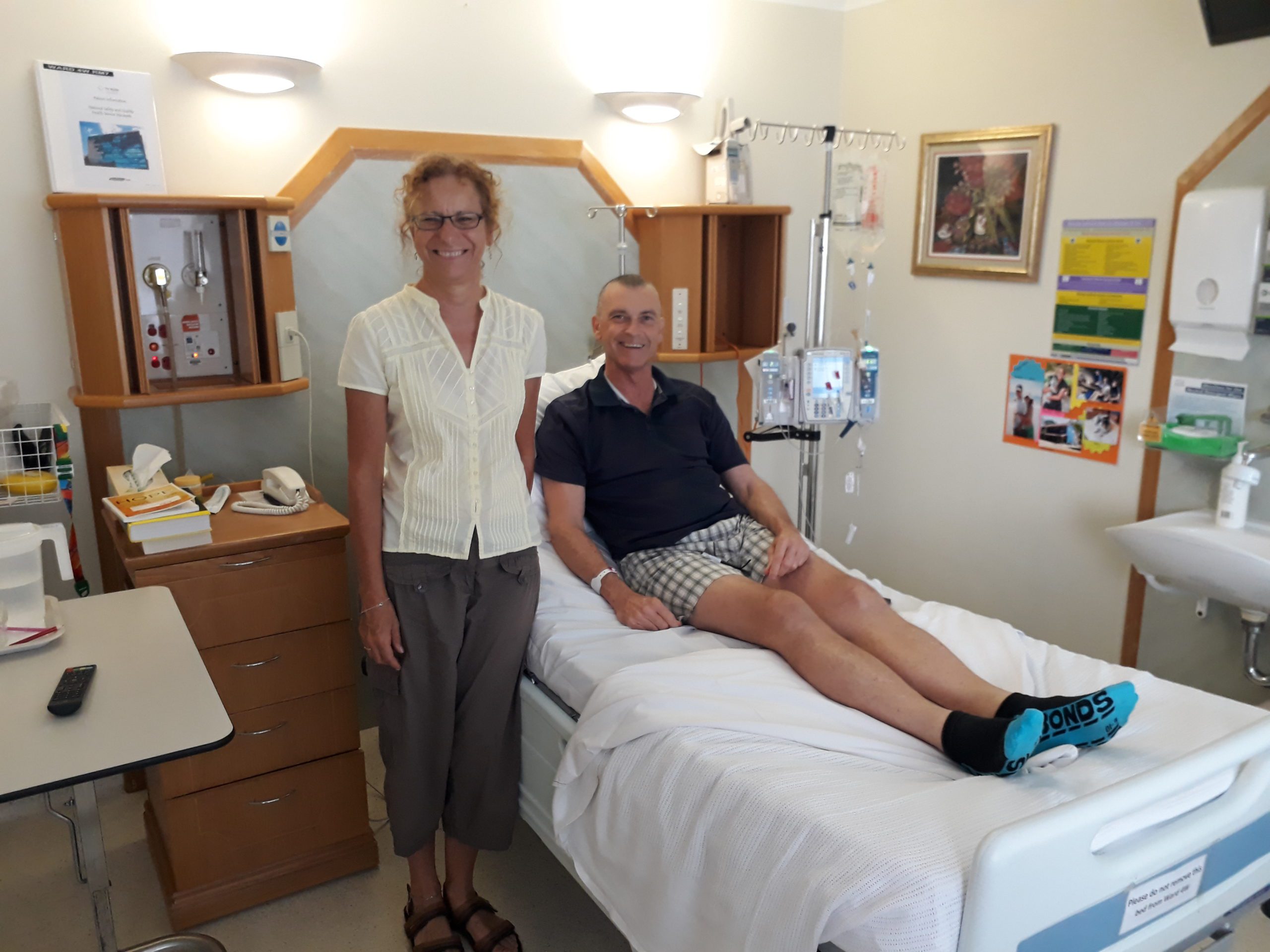
Trevor’s determination to beat blood cancer
When Trevor didn’t respond to his first or second lines of chemotherapy, he had an autologous stem cell transplant in January 2018, which his haematologist said gave him the best chance of a long-term good outcome.
After six weeks in Brisbane for the transplant, and being told that Trevor looked to be “in the clear”, they went home, but not for long, because an infection in Trevor’s Hickman line turned out to be serious.
“It was called mycobacterium fortuitum, which always made me laugh because I thought it doesn’t feel very fortunate,” said Pauline, so back they went to Brisbane for another month for round-the-clock intravenous antibiotics.
Finally, the couple returned home and glimpsed normal life again – camping together, catching up with friends, exercising regularly, and Pauline started her social work again, part-time.
“Life was starting to look good,” she said.
Trevor was in remission and he went back to work for the last six weeks of the 2018 school year.
“Trev led a very quiet life, very similar to what people do now, really, socially isolating. Any friends who were coming over, we’d make sure they were all well and kept their social distance,” said Pauline.
This year, when coronavirus started, Pauline said it felt really familiar: “This is what we used to do all the time. It felt like history repeating itself”.
Towards the end of 2018, Trevor started to feel unwell. He had fevers and fatigue and assumed it was a virus he’d picked up from the school kids, but after a month, when he didn’t get better, his GP suggested another round of scans.
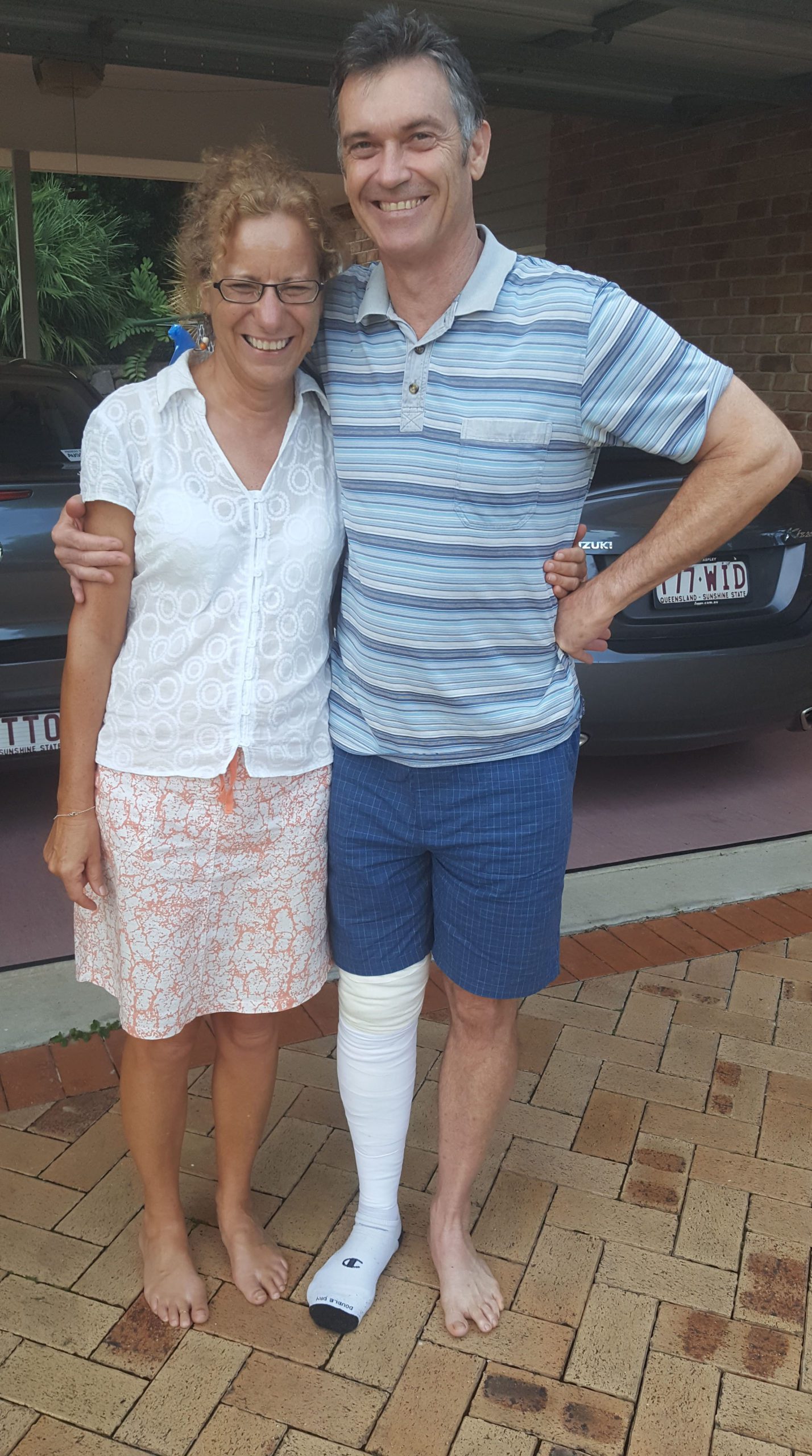
Another relapse and two different diagnoses
On his 57th birthday, on December 29, he got the news. He had a mass on his lung and within days the Boyds were back in Brisbane. Trevor was diagnosed with a different blood cancer – chronic lymphocytic leukaemia – and started a new regimen of chemo. Soon, however, scans showed that it wasn’t working.
Miraculously, a new drug (venetoclax) had been listed on the Pharmaceutical Benefits Scheme that week, which Trevor started immediately, combined with another immunotherapy, not yet approved in Australia, and which cost the couple “several thousand dollars”.
Then, genetic studies revealed that Trevor had “a really bad mutation, c-myc, which doesn’t have a good prognosis”. An allogeneic stem cell transplant was his only option. Disappointingly, none of his three sisters was a match, and he was running out of time to find a matched unrelated donor.
Next, he was told he actually had Richter’s transformation; a disease that looks like NHL but is “something much worse” because it constantly mutates, and CAR T-cell therapy in the U.S. would give him the best chance of survival, providing he was accepted on to a clinical trial in Seattle.
“If we got the okay, we had to go right away, and have a spare half a million dollars!” explained Pauline. But first they needed passports, urgently, at $500 each.
“Mine had expired and Trev hadn’t had one for 20 years.”
They also were in the middle of selling their home in Bundaberg.
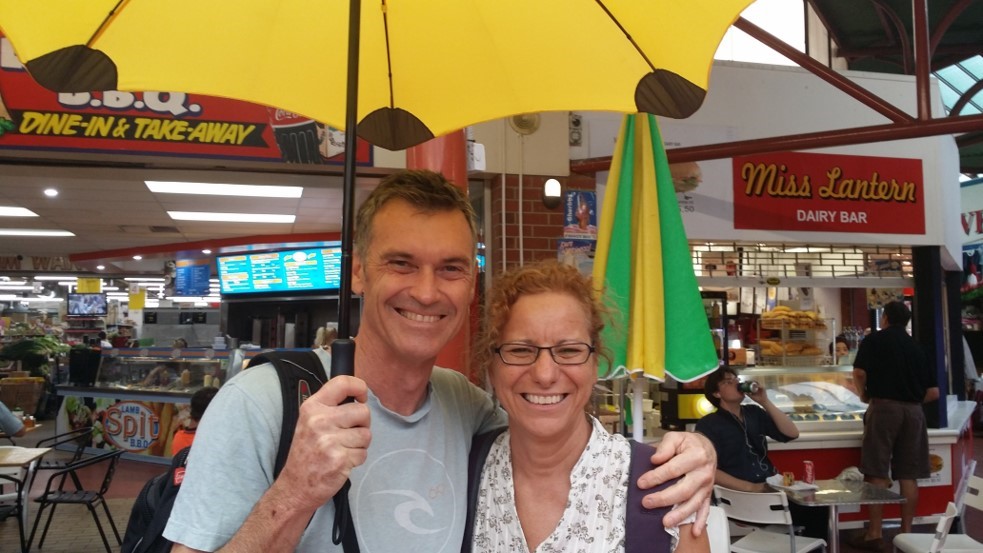
“We just thought, ‘oh well, we can do that’. We’d borrow money from everyone and anyone, get our super, and pay people back.
“That’s the kind of pressure you’re under. I thought I was going to go mad. I could barely cope,” explained Pauline.
“When we had the relapse in January 2019, I couldn’t cope… I had a real little meltdown.
“Trev was really tough, and he was stoic all the way through, but I started to fall apart.
“I got myself together, went to counselling, went to my GP, started antidepressants… because I’m a social worker; I know what you’re supposed to do to look after yourself.
“I thought, all right, I have to be like Trev, to be strong. We just have to keep going.”
Leukaemia Foundation support
Pauline had been in contact with the Leukaemia Foundation and one of our blood cancer support coordinators, Sheila Deuchars.
“Sheila was great. She put us in touch with some Australians who were over there [in the U.S.] at the time doing the same thing and we had been in contact with them.”
But, at the last minute, Trevor was told he wasn’t eligible for the American trial because his disease was mutating.
“That was so disappointing, but we were still hopeful,” said Pauline.
“Trev was writing to professors all over America to see what trials were coming up that targeted the CD20 mutation.”
Then, another miracle, a clinical trial was starting… in Brisbane! Trevor just had to have all the tests and tick all the boxes, which he did. He was eligible, and the trial paid for their travel and accommodation expenses.
“Fantastic, we could fly to Brisbane instead of driving or taking the train,” said Pauline.
Trevor started the trial in August [2019] but, after six weeks, he’d had “absolutely no response”.
“That’s when we had the big conversation with the specialist,” said Pauline.
“He said, ‘we’ve thrown everything at it… you might as well go home and make your end-of-life preparations’ blahdy blah, but there was still one option, ‘we could try high dose chemo as a last resort. Go home and think about it’.
“I knew Trev was never going to give up. He was going to keep fighting. That’s the way he had to go.
“He still was feeling pretty well, still working around the house and gardening.”
Pauline said her worst fear was that Trevor would go to 4W, the hospital ward for people on high-dose chemo, and be transferred to 4A, the palliative care ward.
“For three years, on and off, I’d look at that ward. My sister who died of cancer in 2013 had been in that ward,” she said.
When Pauline suggested they go on the Ghan, “something we’ve always wanted to do”, his response was ‘no, I can’t go on a holiday. I won’t enjoy it if I’m not fighting for my life’.
“I said to him, ‘of course, I’ll support you, whatever you decide’.”
Trevor started high dose chemo in September [2019] and had radiation as well.
“It was pretty awful, just one nightmare after the other, in October, November, until early-December when it didn’t work,” said Pauline.
“Trev was in hospital all that time. I just wanted to be with him, I didn’t want to be anywhere else.
“We were so grateful for the Leukaemia Foundation. I took up Sheila’s offer of a unit at Herston. It was so lovely. I’d get the bus in [to the hospital] in the morning, I could stay as long as I liked, and get an Uber at night to come home. It was so easy.”
It was Pauline’s 58th birthday on December 10, “we got some lovely photos”, and Trevor died eight days before his 58th birthday.
“While all that was happening, we sold the house, and the contract was a story in itself!
“Harry, our dog, died too last year, in April. We had to put him down. We loved him so much. He was so special to us because we don’t have children.”
When Pauline spoke to Living Well With Grief, six months after Trevor’s death, she said it “was wonderful” living in a granny flat that adjoined Trevor’s sister’s house in Brisbane, for the time being.
“I’ve been on my own, but not really alone. I’ve got contact with family, but without feeling like I’m in the way,” said Pauline.
“I appreciate the support and having someone who cares whether you get up in the morning, because so often I just didn’t see the point.
“But every day I’ve got out of bed, because Trev’s sister and her husband have been so lovely to me, I don’t want to worry them about anything.”
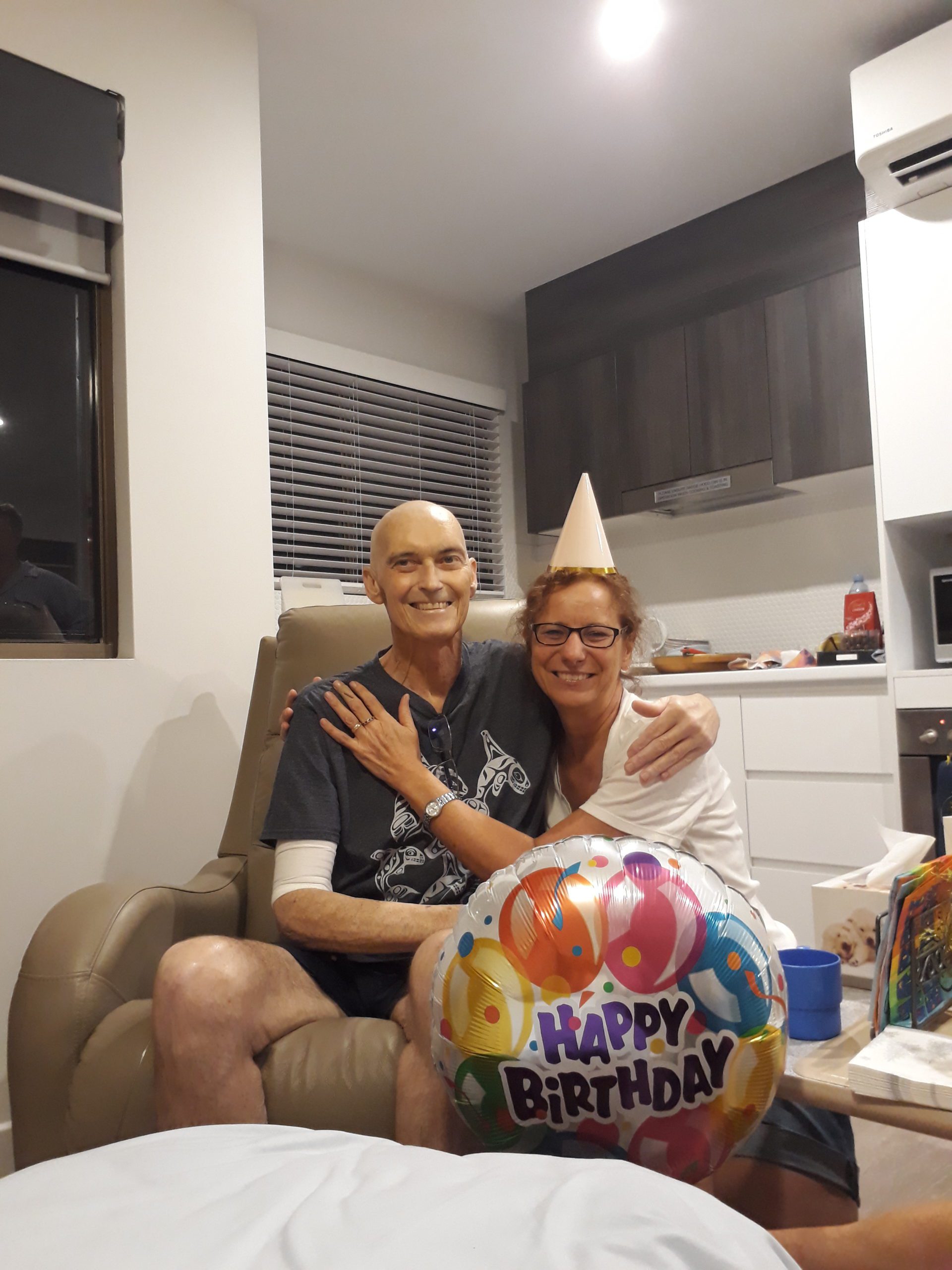
Grief support there when needed
Since Trevor’s death, Pauline has been supported by Shirley Cunningham from the Leukaemia Foundation’s grief and bereavement team.
“I said to Shirley, ‘I’m the perfect client. I’ll do everything right to try and get through this. I’m not going to let it beat me’.
“But I still feel really sh*t, so that’s why I’ve come to counselling. I had my first appointment about two months after Trev died and I knew I wasn’t doing too well, and it was really lovely talking to Shirley.
“I was a social worker for 30 years. I’d never done grief counselling but thought I understood grief a bit. When my sister died, I thought, ‘okay, this is how it works, this is pretty sh*t, but okay, and when Trev was diagnosed, and then when I knew he wasn’t going to make it, I thought I was prepared.
“But you know, losing the person that you love most in the world, nothing really prepares you for that.
“One positive thing about cancer is that Trev and I had plenty of time together to say all the things you want to say, and I’m very appreciative of that, but it certainly doesn’t prepare you for the depth of grief you feel afterwards.
“Trev was really organised, making sure our super was good, so financially, I’m quite comfortable.
“We had grey nomad plans. We’d done a few three-month camping trips around Australia and we were just going to do more of the same… four-wheel driving.
“I do find that hard, letting go of the life that you thought you were going to have.
“It’s just accepting that things have to change. It’s trying to be mindful, trying to live in the present rather than focus so much on longing for the past.”
Pauline said she has experienced a loss of identity: “I was a social worker, but I’m not. I was married, but I’m not. I used to live in Bundaberg, but I’m not. I used to have a house, but I don’t.
“I used to be married, but now I’m a widow. I’m thinking, well, who am I? Who am I without Trev?
“I had a good chat to Shirley about regression, which I’d read about.
“You are stripped back to your most vulnerable self. I felt like I was in my teens again for quite some time. I felt so vulnerable. I didn’t want to talk to anyone, I didn’t want to go out.
“Then I did this complete about-turn. I became the Academy Award recoverer, where you say to everyone, ‘I’m fine. I’m going okay. Oh, not too bad’.
“I did that for a couple of months, because you want them to think you’re okay. You want them to think well of you, that you are recovering.
“I said to Shirley, ‘you’re the only person I’m crying with these days and I don’t think that’s good. I’m just covering up all the time’, so we had a good chat about that and what I should do.
“Grief is a very weird thing. I realise now why you do certain things and I’m very normal. The book I’m reading now is The Year of Magical Thinking which is about the difficulty you have with emotional acceptance.
“I was there when Trev died, but you still have so much trouble accepting it and you still think maybe somehow they’re still alive. I’d wake up in the morning thinking Trev was still alive.”
Making a new life
Pauline has decided to stay in Brisbane, plans to buy her own home there, and is putting things in place.
She has started going to church again and says, “I do have a faith, I do believe in an afterlife, and that has helped”, has become more active in her yoga practice, and has started bike riding with her brother-in-law.
She regularly sees her two brothers who live in Brisbane and has reconnected with a few friends, including an old uni friend she hadn’t seen for 30 years. And Simone, who she met when her husband Pete was sitting beside Trevor during chemo, has become a good friend.
Pauline had always wanted to “do something with people who care for wildlife” in her retirement and due to some divine intervention, she is volunteering two days a week at a koala sanctuary, which is helping her to “just be in the moment”.
And she’s started a journal.
“I’ve found journaling very helpful. At first, when I was just so miserable, I kept writing about how terrible I felt, and I didn’t know if that was helping. Then I received a random text from someone that said, ‘remember the joyful times you had with Trev’, and I thought, that’s what I need to do.
“So, every night I made sure that at the end of my journal writing, I’d write down a happy memory and thank Trev for that. Sometimes that was really hard, but I did that for months.
“And now I don’t do the happy memories anymore, I just do gratitude now. I’m still writing to Trev, but I finish with things that I’m grateful for that happened during the day,” said Pauline.
“I do believe Trev is still present in some form, in some way, and is still looking after me somehow. And I just figured, well, this is my way of communicating with him.
“I don’t think I’ll keep writing to him for the rest of my life, but I’m determined to keep going with it for this year.”
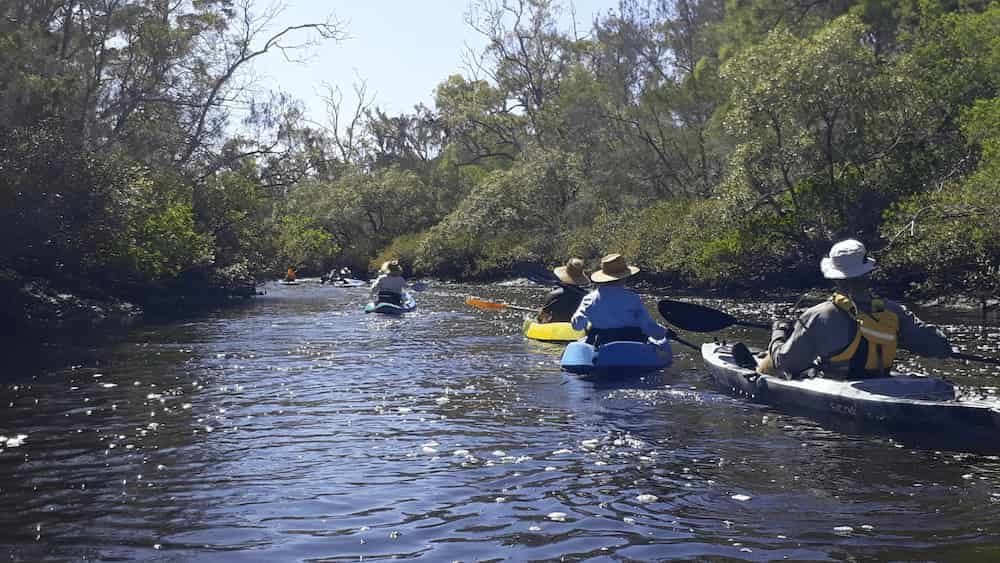
A tribute to Trev
Back in Bundaberg, Pauline used to kayak with a group of women, and one time Trevor joined them.
“One of my friends suggested it would be nice to have a paddle tribute to Trev, which I thought was a great idea.”
The tides were checked, a date was set, and Pauline went up to Bundaberg for the weekend.
“We ended up with 13 people and two dogs, and I decided to take half of Trev’s ashes for a little ceremony.
“Bundaberg ginger beer was Trev’s favourite drink before he went off all sugar, and I put half of his ashes in six Bundy ginger beer bottles, one for each of his best mates, and me, which we carried upstream to a lovely, quiet place.
“I thanked everyone, then they picked up their bottles and I put his ashes in the creek.
“I was so happy I did that and again, divine intervention, it was at the beginning of March, only a couple of weeks before coronavirus kicked in, and I thought, ‘oh, Trev, you’re looking after me’.”
Pauline wanted special mention made of how grateful she and Trevor were to the Leukaemia Foundation, “for everything they helped us with”. In particular, the practical support of “those two months when I lived in the Leukaemia Foundation unit”.
“I’m a regular donor now and I’ll be making a bequest in my will when I redo it again. And I’ve registered for Light the Night.”
Last updated on March 25th, 2021
Developed by the Leukaemia Foundation in consultation with people living with a blood cancer, Leukaemia Foundation support staff, haematology nursing staff and/or Australian clinical haematologists. This content is provided for information purposes only and we urge you to always seek advice from a registered health care professional for diagnosis, treatment and answers to your medical questions, including the suitability of a particular therapy, service, product or treatment in your circumstances. The Leukaemia Foundation shall not bear any liability for any person relying on the materials contained on this website.